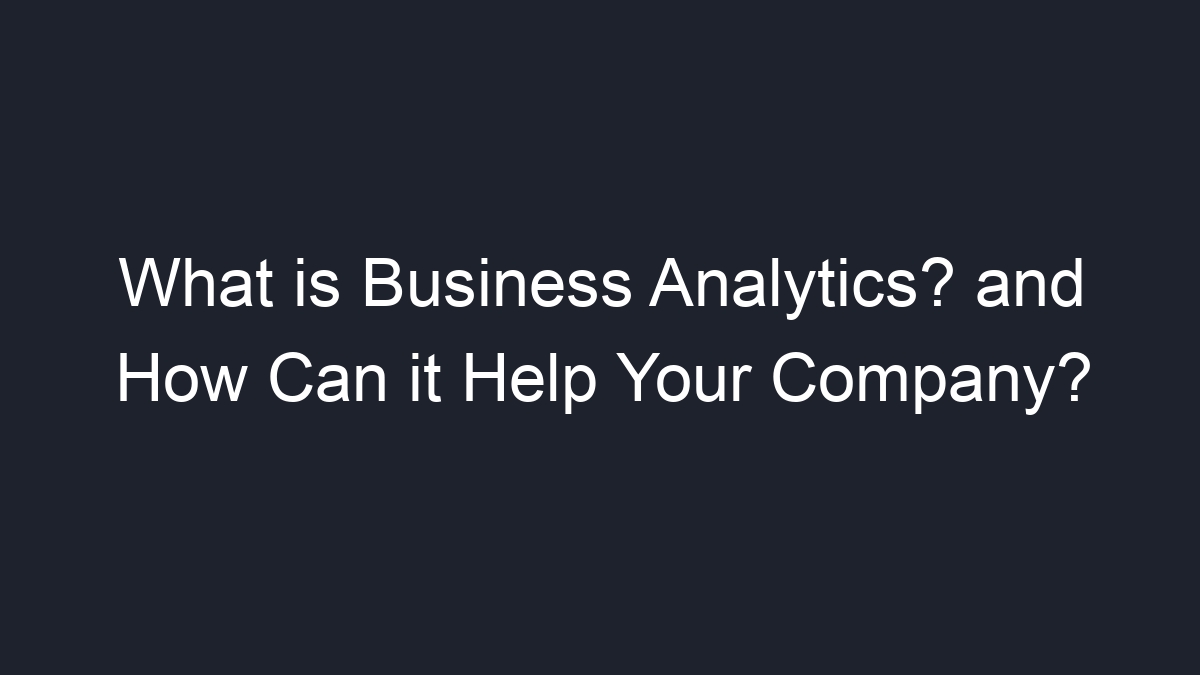
Business analytics – When to invest? I reached an interesting agreement, now what should I do? How do I know the best time to launch my product?
If these questions are hanging in your head — or you’ve found yourself in a situation, then you need to know business analytics; innovative practices to realize more and better offerings.
Through predictive data analysis, you will be able to visualize different scenarios, positive and negative, to create solutions and support strategic planning and its effective execution.
Digital transformation is great, but what’s even more extraordinary is what we can put to good use. In this opportunity, you will learn tools that will help you improve your business management and competitiveness.
What is Business Analytics?
Business analytics or business analysis, for its translation into Spanish, is the process of collecting, processing, studying and classifying business data in order to derive key business information and effectively reach your target audience.
The aim of this technique is to reduce the risk of any organization by gathering useful data for the future using tools such as statistical analysis, data mining and/or predictive models that contribute to decision making.
In this way, it is possible to determine which data sets are desired and how best to utilize them to optimize problem solving and increase efficiency, revenue and productivity.
With a secure business proposal, the chances of generating economic losses are reduced and profit margins are increased.
In business analysis there are 3 types of business analysis:
- Descriptive: It is based on the interpretation of historical information to determine patterns and trends.
- Predictive: Takes descriptive data and uses it to predict statistics about future outcomes.
- Prescriptive: Here you start by trial and error, doing tests and other types of practice to identify the scenario that produces the best results.
With all that said, it is evident that there are certain similarities to big data and business intelligence, but they are very different. Find out why below!
How Does Business Analytics Contribute To The Growth Of Your Business?
You already know what it is and how it differs from other practices and technologies, but how does it contribute to the profitability of your business? As follows:
Data-Driven Decision Making
Business analysis is an indispensable resource in making strategic decisions.
For example, if we run a restaurant, we can carry out an analysis to determine whether the delivery option is best suited for the client and, in this way, safely launch strategic planning, after analyzing the statistics and probabilities of different situations.
Increase The Level Of Income
Organizations that invest in BA —and with it big data—see their rates of return and increased rates due to the security of the operations performed.
Avoiding mistakes is synonymous with big savings in: raw materials, travel costs, labor, among others. Organizations that rely on their own data collection and analysis are the ones that experience the greatest economic returns.
But why? Simply put, they were able to consolidate more and better business strategies aimed at meeting the needs of buyers previously identified and studied through several business simulations.
Achieve Better Business Operations
Because business operations go hand in hand with economic benefits, companies use predictive analytics to prevent operational and maintenance issues before they escalate into larger issues.
Indeed, precaution is a strategy that has made it possible to close more deals and retain more customers with our brands.
With good experience, planning and competitiveness, it is only a matter of time before you can sign off on an outstanding commercial operation.
Technology helps us to increase our business opportunities and company growth. However, implementing digital transformation is not an easy task, for that we have prepared materials with 8 best practices to help you in this difficult process.
Whats The Difference of Big Data and Business Intelligence?
Of course! To get a detailed overview of these issues, we will go through the differences one by one with each:
Business Analytics (BA) vs. Business Intelligence (BI)
Comparison with business intelligence or business intelligence, because of its translation into English, is very frequent. While it is true, both analyze, visualize and collect data and can work together, there are some special differences worth noting.
BA focuses on predictive analytics through data mining, being able to anticipate developments and make the changes necessary for business success.
On the other hand, BI focuses on descriptive analysis, responsible for providing historical synthesis of data to show what is happening or happened.
In other words, it answers the “how” and “what” questions, so any business can make process changes and replicate what works.
BI is oriented to verify what happened in the past, examine the company’s historical reports to understand its development, can access a series of data prepared, stored and classified. Everything is stored on a central server, where it is studied and conclusions drawn.
In contrast, BA directs its eyes to the future, facilitating the creation of visions based on predictive models, influencing the planning and execution of new strategies and pathways. It is not in charge of studying internal statistics like business intelligence. It uses various sources, trends or macroeconomic indicators.
Business Analytics vs Big Data
It makes no sense to talk about BA and BI without taking into account big data, which is based on storing and processing large amounts of data, whereas the previous two examine that information and use it to optimize their decisions.
Looking at it from another perspective, without big data, there can be no analytics or business intelligence; but it doesn’t happen the other way around.
According to the professional profile is another way to understand why the two methodologies work separately:
- Business analytics: Work teams usually consist of experts in marketing, business administration, economists, technicians and engineers.
- Big data: Among the common profiles are engineers, mathematicians and statisticians.





